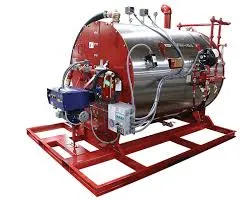
Oct . 06, 2024 06:14 Back to list
steam system boiler
Understanding Steam System Boilers
Steam system boilers are critical components in a variety of industrial processes. They play a pivotal role in generating steam, which is essential for heating, power generation, and various manufacturing processes. This article will explore the fundamentals of steam system boilers, their working principles, types, and applications, as well as the importance of maintenance for optimal performance.
At the core of any steam system is the boiler, which converts water into steam by applying heat. This heat is usually generated by the combustion of fuels such as natural gas, oil, or coal, although electric boilers are also gaining popularity. The steam produced can be utilized for diverse applications, including space heating, process heating, and driving turbines for electricity generation.
The efficiency of a steam system boiler is influenced by several factors, including the type of boiler, fuel used, and design features. Common types of steam boilers include fire-tube boilers and water-tube boilers. Fire-tube boilers, which have a series of tubes that convey hot gases from the combustion process, are simpler and tend to be used in smaller applications. In contrast, water-tube boilers circulate water through tubes that are heated externally by the combustion process, allowing for higher pressure and temperature operation, making them suitable for larger industrial applications.
steam system boiler

Steam system boilers are widely used across various industries. In the food and beverage industry, for example, steam is vital for cooking, sterilization, and cleaning processes. Similarly, in the chemical industry, steam is used for heating reactors and distillation columns. In power generation, steam boilers are integral to the functioning of steam turbines, which convert thermal energy into mechanical energy and, subsequently, electricity.
Despite their significance, steam boilers can pose significant risks if not properly maintained. A malfunctioning boiler can lead to pressure build-up, leaks, or even explosions, which can have catastrophic consequences. Therefore, regular maintenance is essential to ensure the safe and efficient operation of steam systems. Routine inspections, water treatment to prevent corrosion, and regular cleaning of boiler components will help in prolonging the life of the equipment and improving its efficiency.
Another crucial aspect of steam boilers is their environmental impact. Many industries are now focusing on reducing greenhouse gas emissions and transitioning towards cleaner energy sources. Modern steam boilers increasingly employ advanced technologies, including economizers and selective catalytic reduction (SCR) systems, to enhance efficiency and minimize emissions. Furthermore, the integration of renewable energy sources, like solar thermal or biomass, is becoming more common in steam generation processes, paving the way for more sustainable industrial practices.
In conclusion, steam system boilers are vital in numerous industrial applications, serving as the backbone of many processes. Understanding the types, operations, and importance of maintenance can significantly enhance safety and efficiency. As industries continue to evolve, the focus will likely shift towards smarter, more sustainable steam generation technologies. Adapting to these changes will not only improve operational performance but also contribute to environmental sustainability, ensuring that steam system boilers continue to play an essential role in various sectors for years to come.
-
High-Efficiency Commercial Oil Fired Steam Boiler for Industry
NewsJul.30,2025
-
High-Efficiency Biomass Fired Thermal Oil Boiler Solutions
NewsJul.30,2025
-
High Efficiency Gas Fired Thermal Oil Boiler for Industrial Heating
NewsJul.29,2025
-
High-Efficiency Gas Fired Hot Water Boiler for Sale – Reliable & Affordable
NewsJul.29,2025
-
High Efficiency Biomass Fired Hot Water Boiler for Industrial and Commercial Use
NewsJul.29,2025
-
High-Efficiency Biomass Fired Hot Water Boiler for Industrial Use
NewsJul.28,2025
Related PRODUCTS






















